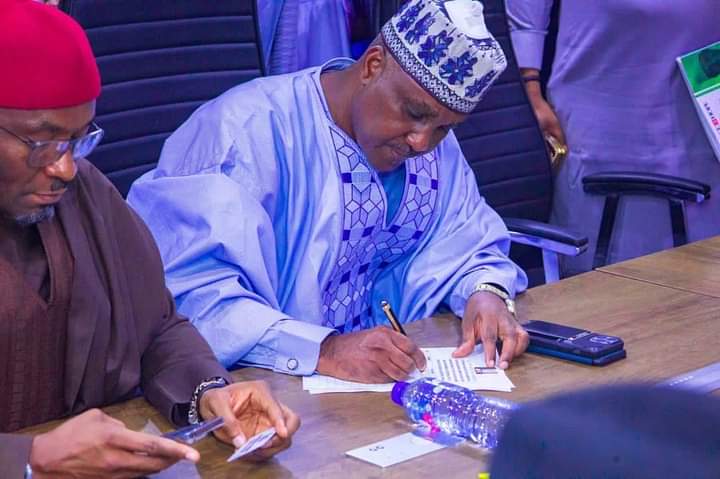House of Representatives Speaker Abbas Tajudeen has urged Igbo leaders in the South-East geopolitical zone to engage the government in addressing the legitimate grievances of their people.
Speaker Abbas, in his address at the launch of the Peace in the South East Project, an initiative of the Deputy Speaker, Rt. Hon. Benjamin Okezie Kalu, decried that despite South-East’s economic strengths, agitations in the zone had caused it colossal losses.
Speaking on Friday at the event held in Bende, Abia State, Kalu’s hometown, Speaker Abbas stated that the peace in the South-East is, by extension, the peace and progress of the entire Nigeria.
The Speaker noted that the PISE-P was borne out of his deputy’s deep love for the zone and profound concern over the rise of insecurity, “which has cast a dark shadow over the region.”
He lamented that the wave of insecurity “continues to cripple daily life and significantly paralyse socio-economic endeavours, in a region whose people are renowned for their resourcefulness and economic enterprise.”
Speaker Abbas, therefore, described Hon. Kalu’s project as a “historic and patriotic endeavour.”
The Speaker said: “It may be recalled that between 1956 and 1965, the then Eastern Region was regarded as the fastest-growing economy in Africa and Asia. Indeed, the South-East has remained an economic powerhouse in Nigeria and Sub-Saharan Africa, leading in trade and commerce.
“From Aba to Adamawa and Enugu to Europe, Igbos are known to be entrepreneurial, resourceful, peace-loving, savvy, tenacious and peace-loving. That is the character of the Igbos. That is who you are. Three of your cities, Aba, Onitsha and Nnewi, are among the most industrialised in Nigeria.
“A sizeable chunk of the major investments in many parts of Nigeria are Igbo-owned. Your contributions to the Nigerian economy, either through imports, business investment, or diaspora remittances, among others, are indisputable.
“The contributions of the Igbos are apparent not only with regard to the economy but also in all fields of human endeavour, including literature, academia, the creative industry and many more.”
Speaker Abass said unfortunately, with its rich history, vibrant culture, and significant contributions to Nigeria’s economic and social fabric, the region had faced numerous challenges in recent years.
“These challenges have often manifested in the form of separatist agitations, unrest, and terrorism. The consequences on both lives and property have been colossal,” he said.
To address these issues effectively, the Speaker said the stakeholders must first understand their root causes.
Speaker Abbas noted: “These underlying causes include the sense of marginalisation and the feeling by many people in the South-East that their voices are not heard and their concerns are not adequately addressed in the national discourse.
“Secondly, the general economic challenges and the attendant lack of sufficient economic opportunities fuel frustration and make the youth more susceptible to radical ideologies. This is true for most parts of Nigeria, not just the South-East.
“Additionally, we cannot ignore either should we be ashamed to acknowledge the historical context, including memories of past conflicts and perceived injustices that continue to influence the current sentiments in the region.”









